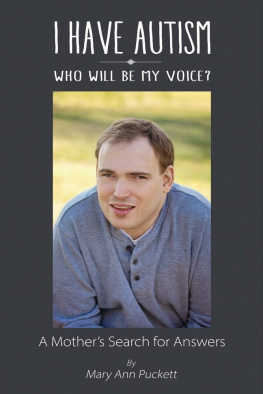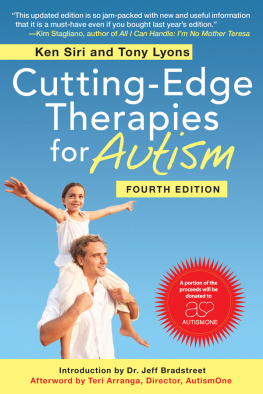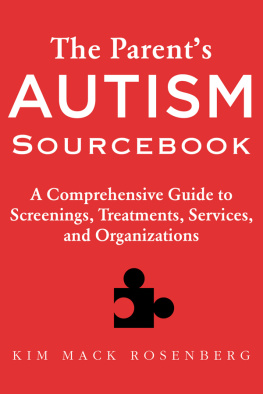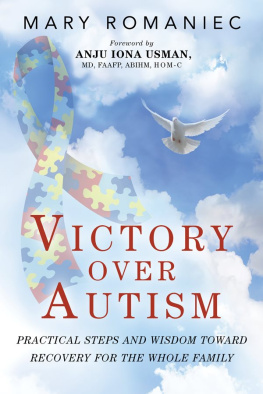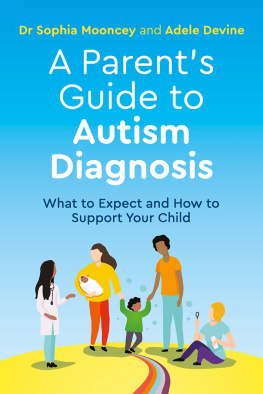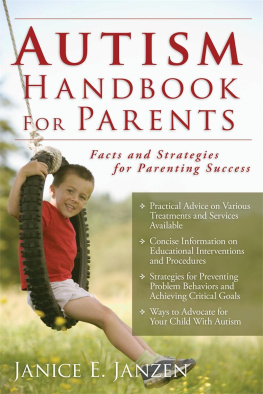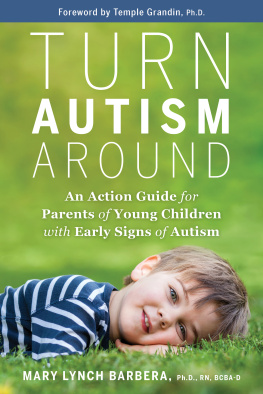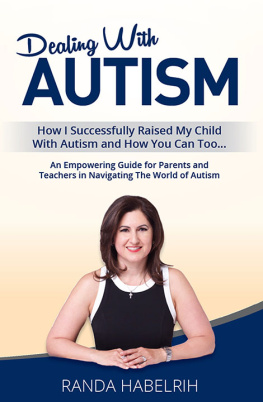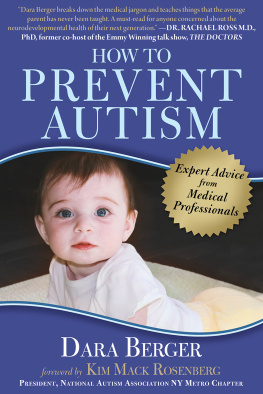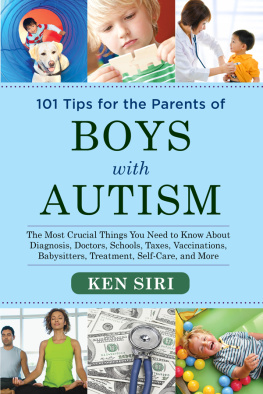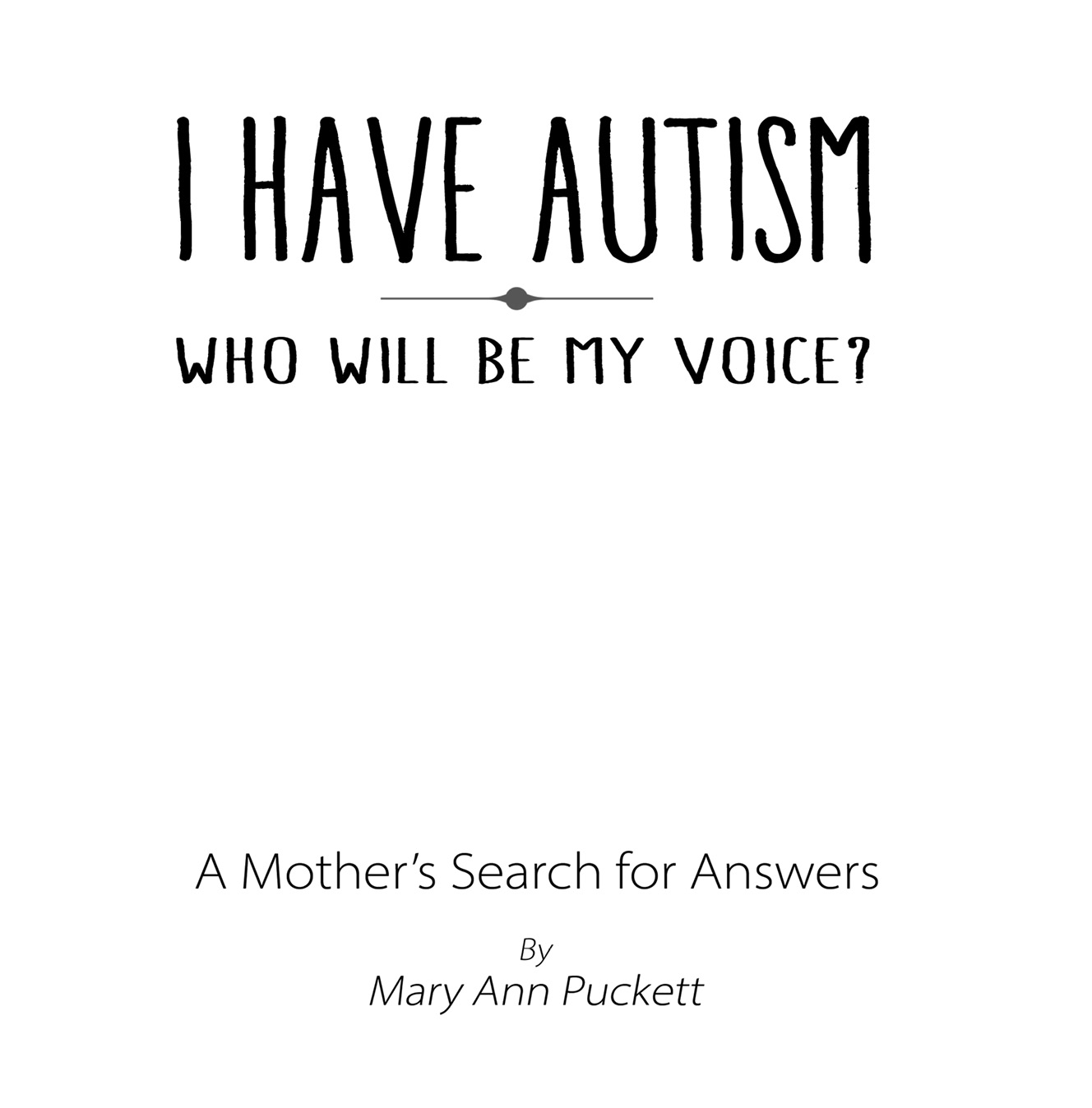
Cover Design: Ashley C. Thomas
Sweet Fig Photography
2017 Mary Ann Puckett. All rights reserved. No part of this publication may be reproduced, distributed, or transmitted in any form or by any means, including photocopying, recording, or other electronic or mechanical methods, without the prior written permission of the publisher, except in the case of brief quotations embodied in critical reviews and certain other noncommercial uses permitted by copyright law.
ISBN (Print) 978-0-97679-551-3 (Ebook) 978-0-97679-552-0
DEDICATION
This book is dedicated to the memory of Elizabeth Grace Filby, BA (Hons) Cert.Ed. FRSA., who was a friend, helper, and valued resource to my son Stephen and me.
January 30, 1952June 26, 2016.
ACKNOWLEDGMENTS
There are a number of professionals I want to recognize for their valuable contributions in sharing information that has improved the quality of life for my son, Stephen, who has Early Infantile Autism and Lennox-Gastaut Syndrome.
Dr. Russell Blaylock, M.D., is a retired neurosurgeon, published author, and has worked as an assistant professor of neurology. On several occasions Dr. Blaylock provided information to me on natural supplements that greatly reduced Stephens seizure activity, which I believe has been lifesaving.
Dr. Stephanie Seneff, PhD., is a Senior Research Scientist at MIT, and has also provided me with information that has proven beneficial for my son, such as ways to activate sulfur in his body to help with his medical diagnosis of encephalopathy. She has additionally made suggestions on important dietary changes for Stephen. In 2013, she was a contributing author to a published paper, Is Encephalopathy a Mechanism to Renew Sulfate in Autism?
Grace Filby, BA (Hons), Cert.Ed. FRSA, was a Science and Engineering Ambassador, in Reigate, England. Grace was an advocate for getting critical information out about the use of bacteriophages to stop deadly infections like MRSA and E.coli. Stephen was treated with a bacteriophage in 1990, which I believe saved his life. In 2007 Grace was awarded a Churchill Traveling Fellowship through the Winston Churchill Memorial Trust. The Fellowship afforded her the opportunity to travel to international bacteriophage conferences where she met leading scientists and doctors. In 2008 Winston Churchills daughter, Lady Soames, presented Grace with the Churchill Fellows, Silver Medallion award for her research on phage therapy. Phages are natural waterborne viruses that attack and destroy bacteria. In 2015 Grace was invited to Buckingham Palace where she received recognition from Her Majesty Queen Elizabeth for her research on bacteriophages. Grace was a very dedicated, caring person, and I felt honored to call her my friend. Sadly, due to her passing in June 2016, she will be greatly missed. Her vast knowledge of health information will be missed by health professionals, and I will personally miss her ongoing support of my advocacy for autism. We also shared the connection of knowing from experience what phage treatment can do for critically ill people.
I also want to acknowledge Dr. VJ Conrad, M.D., and Dr. Heather K. Geis, M.D. Dr. Conrad began treating Stephen when he was totally nonverbal at the age of six. I will always credit her for Stephen being verbal today because of her decision to do early intervention with allergy testing and to check his amino acid levels, which were addressed with supplements recommended by the laboratory that evaluated his bloodwork. She was also the only doctor who was willing to prescribe a sleep medication for Stephen to help our family recover from the eight years of sleep deprivation due to Stephens daily meltdowns. Dr. Conrad is a doctor who listens and thoughtfully makes every attempt to find answers for her patients.
Dr. Geis has been Stephens psychiatrist for the past twenty-one years. She is a very compassionate doctor, who has literally provided a shoulder for me to cry on. Her willingness to help me find information on autism is without measure. As she stated in her endorsement, she has been with us through times of great joy and of overwhelming adversity, and for this I will forever be truly grateful.
Many thanks to these wonderful and caring individuals who have helped me learn so much on this autism journey.
INTRODUCTION
As I look into the eyes of my thirty-five-year-old autistic son Stephen, I cant help but wonder what thoughts are going through his mind. Does he understand that I miss him when hes not with me, and will he ever understand how deeply I love him? Parents of children like my son spend countless hours pondering thoughts like these. Thoughts about who will say I love you to Stephen and, more importantly, what will happen when I can no longer care for my child? The uncertainties of this life are a given, but when you have a child that is disabled, the intensity of this uncertainty is endless. If only Stephens autism was just a bad dream, then I could suddenly wake up and find that he is like other young men who are driving, dating, holding down a job, getting married, having children, and living independently. Unfortunately, in Stephens case, he will never be able to do those things, and his autistic condition is not just a bad dream, its a reality.
CHAPTER
Diagnosis and Hurdles
On June 10th, 1996, at age fourteen, Stephen was diagnosed by Dr. Bernard Rimland, PhD., with Early Infantile Autism, also known as Kanners Syndrome. Dr. Rimland was a research psychologist who wrote, lectured, and researched information about autism for many years. The diagnosis that Dr. Rimland gave Stephen means that my son functions on the lower end of the autism spectrum. My husband and I had been trying for many years to get doctors to give a definitive answer as to what was going on with Stephen because real concerns for his future existed. As an adult, Stephens level of functioning is still very limited. His cognitive level is at about five to six years of age. He can do some academic tasks like solving simple addition and subtraction problems using a calculator, and reads with a very limited level of comprehension.
Even though Stephen made little eye contact from very early in his life and appeared to be content being alone in his own world, I still attempted daily to make a meaningful connection with him. Using various methods, in an attempt to get into Stephens world, we discovered very early that he reacted positively to music, as many children with autism do. I played various types of music for him, ranging from classical to popular and country western. When he was around one year old, I additionally started playing a series of records for him from a phonics program called Playn Talk, developed many years ago by a woman in California named Dr. Marie LeDoux, PhD. The catchy tunes on the Playn Talk records seemed to hold his attention, even though he was still not making eye contact. When the music started playing, Stephen stopped whatever he was doing and listened very intently.
At age six, Stephen finally began to talk, and it quickly became evident that he had the ability to sound out and read simple words from newspapers and magazines. I cannot state definitively that the phonics program helped Stephen develop this skill, but I personally believe it did play a part. During this same timeframe, one of the teaching assistants in Stephens classroom reported that they were shocked when he suddenly picked up a book on display and read thirty pages out loud. She said he then just put the book down and walked away as if nothing was unusual about what he had just done. Even today his spelling is still quite good, but his reading comprehension remains very limited.

